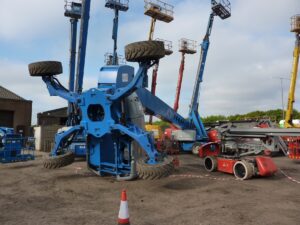Company fined after fatality involving a mobile elevating work platform
A Lincolnshire based manufacturing company that specialises in lifting and handling equipment has been fined after an employee died after falling with a work platform onto the M25 motorway.
Reading Crown Co urt heard that Rick Jeager-Fozard, an employee of Kimberly Access Limited, was carrying out a routine pre-delivery inspection on a mobile elevating work platform (MEWP) on 5 June 2013.
urt heard that Rick Jeager-Fozard, an employee of Kimberly Access Limited, was carrying out a routine pre-delivery inspection on a mobile elevating work platform (MEWP) on 5 June 2013.
The MEWP extended to an unsafe angle and resulted in the MEWP falling onto the M25 motorway. Mr Jeager-Fozard was working in the platform of the MEWP, falling with the device.
An investigation by the Health and Safety Executive (HSE) found that the device had become unsafe because a miscalibration of its secondary boom angle sensor, which started to extend even though the boom had not been raised to the necessary angle. It was found that the MEWPs secondary boom had raised to an angle around 6-degrees lower that required, the boom then extended beyond its safe working limit and tipped over.
The miscalibration occurred through incorrect data being manually manipulated and uploaded onto the machine via a laptop using password protected WebGPI software. The carrying out of warranty repairs on the machine during this period, including granting access to the WebGPI software, fell within the conduct of Genie UK Ltd’s undertaking.
Genie UK Limited of The Maltings, Wharf Road, Grantham, Lincolnshire pleaded guilty to breaching Section 3(1) of the Health and Safety at Work Act 1974. The company was fined £270,000 and ordered to pay costs of £165,175.
HSE inspector Stephen Faulkner said: “This was a tragic and harrowing incident. Modern high reach MEWPs rely on accurate data to ensure they extend and operate safely, and steps should be taken to ensure the process of calibrating sensors is correctly followed.
“Companies should be aware that HSE will not hesitate to take appropriate enforcement action against those that fall below the required standards.”
Notes to editors:
- The Health and Safety Executive (HSE) is Britain’s national regulator for workplace health and safety. We prevent work-related death, injury and ill health through regulatory actions that range from influencing behaviours across whole industry sectors through to targeted interventions on individual businesses. These activities are supported by globally recognised scientific expertise. www.hse.gov.uk
- More about the legislation referred to in this case can be found at: www.legislation.gov.uk/
- HSE news releases are available at http://press.hse.gov.uk